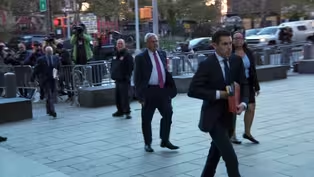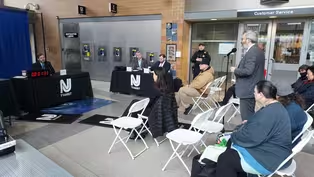NJ Spotlight News
Failures in NJ law to protect students from sexual predators
Clip: 3/6/2024 | 4m 52sVideo has Closed Captions
SCI finds that some sexual predators made their way back into the classroom
A report just released by the State Commission of Investigation finds that some sexual predators made their way back into New Jersey classrooms, even after being accused of misconduct in a previous district. It’s something New Jersey’s so-called Pass the Trash law of 2018 law was meant to stop.
Problems playing video? | Closed Captioning Feedback
Problems playing video? | Closed Captioning Feedback
NJ Spotlight News is a local public television program presented by THIRTEEN PBS
NJ Spotlight News
Failures in NJ law to protect students from sexual predators
Clip: 3/6/2024 | 4m 52sVideo has Closed Captions
A report just released by the State Commission of Investigation finds that some sexual predators made their way back into New Jersey classrooms, even after being accused of misconduct in a previous district. It’s something New Jersey’s so-called Pass the Trash law of 2018 law was meant to stop.
Problems playing video? | Closed Captioning Feedback
How to Watch NJ Spotlight News
NJ Spotlight News is available to stream on pbs.org and the free PBS App, available on iPhone, Apple TV, Android TV, Android smartphones, Amazon Fire TV, Amazon Fire Tablet, Roku, Samsung Smart TV, and Vizio.
Providing Support for PBS.org
Learn Moreabout PBS online sponsorshipA scathing new state investigation is calling out New Jersey's so-called pass the trash law designed to stop teachers with histories of sexual misconduct or child abuse from keeping their records a secret and finding jobs at other schools.
Instead, the damning report finds both educators and school districts aren't only ignoring the law.
In some cases, they're purposely manipulating it at the expense of school kids.
Senior correspondent Joanna Gagis reports.
New Jersey schoolchildren deserve the highest level of guardianship to protect them from having sexual predators in their classroom.
And yet, a report just released by the State Commission of Investigation for New Jersey found that some sexual predators had made their way back into New Jersey classrooms even after being accused of misconduct in a previous district.
It's something New Jersey's 2018 law called Pass the Trash was created to stop.
I'm pretty sure that the state is a safer place that it was a few years ago when we passed the law.
But obviously, there are things that we need to improve to make it even safer for our kids.
Assemblyman Jay Webber sponsored the law that requires an educator who's been accused of sexual misconduct to report the allegation when looking for a new job.
And it requires hiring school districts to request any such background files from the sending school district, which in turn must turn over those documents.
Failure to comply is a class four felony.
But I found cases where those disclosures broke down at every level.
I found this one school district that apparently and purposely evaded the law by coming up with a nondisclosure agreement and sending a sexual predator on to another school.
That's exactly why we wrote the law to stop that kind of thing.
The investigation only looked at about 100 of the state's more than 590 school districts.
Not enough to fully understand the prevalence of the problem, says S.I.
chair Tiffany Williams.
Brewer.
Our recommendation is that the State Department of Education should do a comprehensive audit so that the state of New Jersey, its citizens parents can know how widespread is this problem and what are we going to do to actually fix it?
And the bigger question is who's enforcing it?
The New Jersey School Boards Association convened a meeting in December to raise concern around this issue and put forward a belief statement on it.
It was already on the radar that our boards were concerned with the lack of oversight.
And that belief statement said that, you know, our local school districts need additional resources.
They need related tools and supports to assist them in collecting, maintaining information that will limit or prevent physical or emotional abuse of children by their school employees.
The State Commission of Investigation recommends the Department of Education create a database that all districts and staffing companies who help employee educators can access during the hiring process.
The centralized database needs to be a place that a school district can compare the names of the applicants that they have to see if the applicant is on the centralized database and, you know, a centralized database makes it much easier for smaller school districts that may not be as well resourced in.
And for the larger school districts that are in crises with getting teachers hired.
Assemblyman Jay Webber says they considered a database when they wrote the bill.
But the problem with the database is that teachers are prevented from getting jobs even if they are if they're accused of misconduct.
But it's not established.
Right.
The point of the law was to stop teachers from jumping from one job to another when there were unsubstantiated but open allegations of misconduct that if we start a database that has unsubstantiated allegations in it, that could pose a problem.
I think for teachers who are wrongly accused, we have to balance those interests as well.
So we'll look at that.
How it holds school districts accountable when there have been failures.
Who's responsible?
Is this the superintendent?
Are are there criminal punishments?
Are there fines?
Ultimately, superintendents are responsible and I think our law might benefit from having one individual designated, whether it's the superintendent or someone else who is responsible for these background checks and who will be held accountable if the process has been followed.
Webber says he's open to working with the city and the legislature to make improvements to the law to prevent offenders from slipping through.
And he wants to strengthen penalties for perpetrators.
I'm Joanna Gagis, NJ Spotlight News.
Kalisha Smith on the Healing in the Collective workshop
Clip: 3/6/2024 | 1m 1s | The workshop teaches mental health professionals warning signs of youth suicide. (1m 1s)
Menendez legal strategy unlikely to change, experts say
Video has Closed Captions
Clip: 3/6/2024 | 4m 25s | New charges center on the Menendezes' dealings with Jose Uribe (4m 25s)
New poll: Kim winning favorability contest among Dem voters
Video has Closed Captions
Clip: 3/6/2024 | 5m 11s | Interview: Patrick Murray, director of the Monmouth University Polling Institute (5m 11s)
NJ's driving-high laws under debate
Video has Closed Captions
Clip: 3/6/2024 | 3m 51s | Bill would require blood sample if drivers are suspected to be under the influence (3m 51s)
Relatives of American-Israeli hostages press for release
Video has Closed Captions
Clip: 3/6/2024 | 54s | Tenafly native Edan Alexander’s mother is among them (54s)
Where's the public in NJ Transit's hearings on fare hike?
Video has Closed Captions
Clip: 3/6/2024 | 3m 59s | Transit advocates, commuters are asking for virtual hearing options (3m 59s)
Providing Support for PBS.org
Learn Moreabout PBS online sponsorship
- News and Public Affairs

Top journalists deliver compelling original analysis of the hour's headlines.

- News and Public Affairs

FRONTLINE is investigative journalism that questions, explains and changes our world.












Support for PBS provided by:
NJ Spotlight News is a local public television program presented by THIRTEEN PBS





